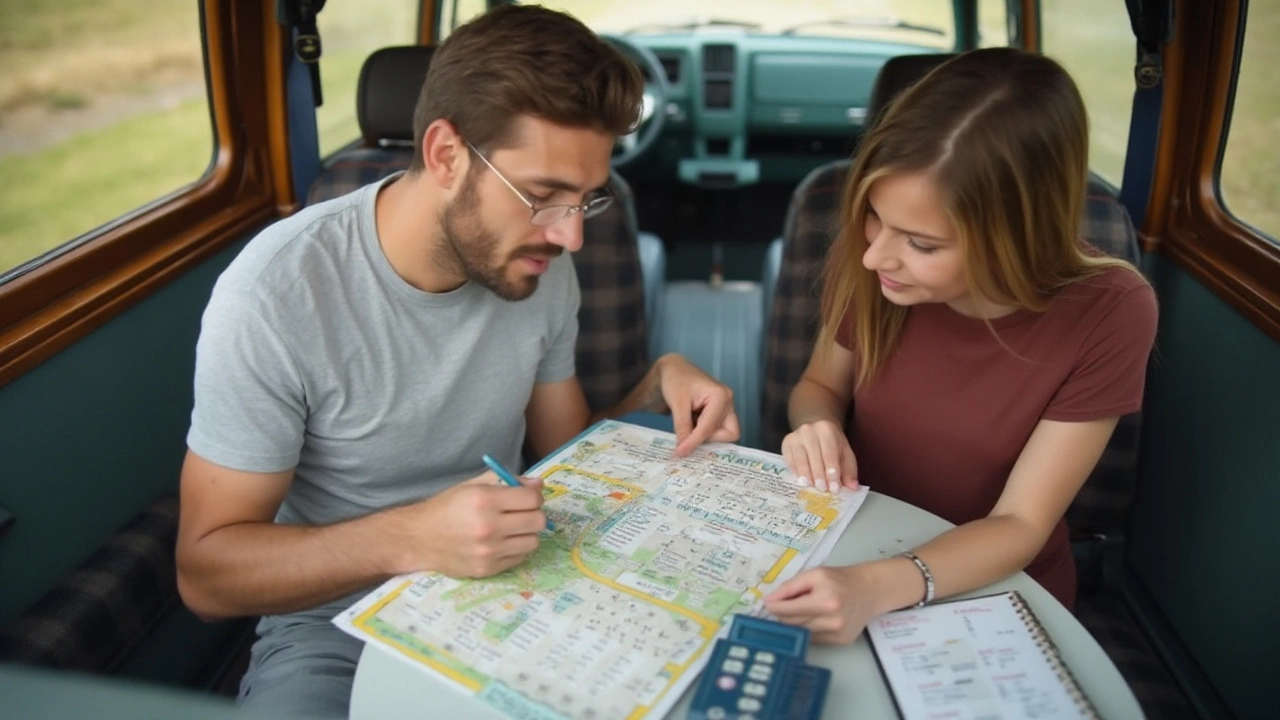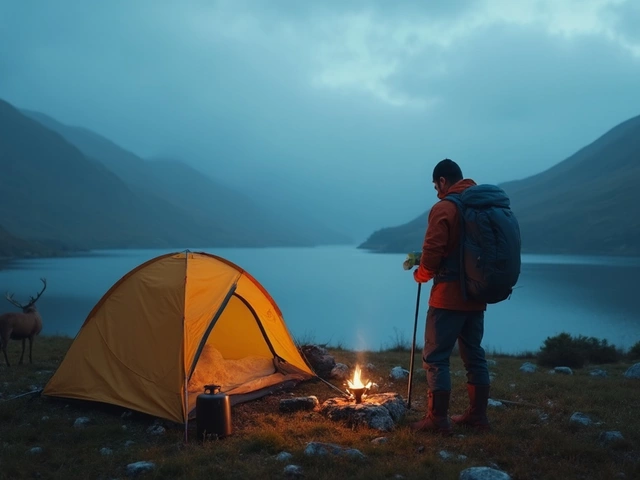Imagine hitting the road in a classic VW campervan, the wind in your hair, music blasting from your favorite playlist, and the open road stretching out in front of you. This experience, cherished by many travelers, comes with not just adventure but also a price tag you need to comprehend before embarking on your trip.
Hiring a VW campervan for a week can vary greatly depending on several factors, and knowing what to expect will help you plan your journey wisely. The dream of road-tripping doesn’t end at just securing a van rental; it includes understanding the costs, including hidden ones that might catch you off guard.
In this guide, we'll explore the costs associated with renting a VW campervan for a week, diving into the specifics of what influences rental prices and how you can save some money on your journey. Whether you're a seasoned road warrior or a first-time adventurer, these insights are designed to help you make the most out of your campervan hire experience.
- Understanding Rental Costs
- Factors Affecting Price
- Additional Fees and Hidden Costs
- Money-Saving Tips for Your Campervan Adventure
Understanding Rental Costs
When you're thinking about hitting the road in a beloved VW campervan, understanding the nitty-gritty of rental costs is indispensable. It isn't just about the base price, which typically ranges anywhere from $800 to $1,500 for a week's hire. Several factors go into that figure, making each rental as unique as the adventure itself. From the model of the campervan you choose to the time of year you plan your journey, each variable plays a significant role in how much you'll spend. Older models, brimming with vintage charm, may cost less than their modern counterparts, yet they may also require more hands-on maintenance during your trip.
The location of your rental can affect the pricing, with rental companies in popular tourist spots like California or Australia offering a wide range of prices. These locations might hike prices slightly due to their desirability. It is also important to remember that insurance is a crucial part of the rental cost puzzle. Ensuring that you're covered for every eventuality may push up the initial price slightly, but it saves you from significant headaches on the road. According to a survey conducted in 2023, 65% of campervan travelers cited fuel costs as a major expense they hadn’t accounted for, indirectly adding to the overall rental cost.
"Renting a campervan involves many hidden costs that, if not considered, can quickly add up. Potential renters should thoroughly research the services included in the base rental fee," says Julian Weatherby, a renowned travel expert.
Rental duration is another piece of the cost puzzle. Many companies offer discounts for extended periods, say a week or more, as opposed to just a few days. This gives you more bang for your buck while extending your exploration time. It’s intriguing to explore how the season plays its part in pricing. Peak tourist seasons, particularly summertime or around holidays, usually see a spike in costs. Off-peak times, however, can offer some surprising deals, making them ideal for those flexible with their travel dates. Additionally, many rental firms offer various packages that include additional items like bed linens, kitchen kits, and sometimes even tents, either for an additional fee or rolled into the base cost.
A closer look at a random sample of campervan rental costs across the globe reveals a surprising variation exposed by a bit of number crunching. While there isn't always a one-size-fits-all pricing model, understanding these dynamics helps you make informed decisions. It’s the little things that count; knowing that unlimited mileage might cost a little more upfront might save you from hefty extra charges later. A budget with room for extras like cleaning fees or late return charges helps avoid unforeseen deductions, keeping your adventure smooth.
Campervan rental companies often have different policies on campervan mileage and maintenance, so it’s vital to clarify these from the outset. A company offering generous mileage allowances might charge more, but if you’ve got an insatiable wanderlust, it could save you money in the long run. Maintenance fees may be included, but always double-check the rental agreement. With great versatility comes diverse pricing; knowing what affects your campervan hire price enables you to tailor the experience exactly to your desires, avoiding unnecessary expenses while embracing the freedom of the open road.

Factors Affecting Price
When planning to hire a VW campervan for a week, understanding the various elements that influence pricing can be as crucial as packing your bags. Firstly, the time of year plays a significant role. During peak seasons—typically the warm months between June and August—demand surges, which inevitably drives up rental costs. In contrast, opting for off-peak periods such as early spring or late autumn can yield significant savings, as businesses lower prices to attract travelers during slower months. The location from where you choose to rent also matters, with rental hubs situated near popular tourist destinations or vibrant cities usually charging more owing to their prime positioning.
The type and age of the campervan are equally pivotal in cost determination. Renting a classic VW T2 model, known for its vintage charm, might set you back more compared to newer iterations like the VW T6, which offers modern amenities and better fuel efficiency. As expected, newer models often come equipped with additional features such as GPS, heated seating, and advanced safety systems, which can be a boon for less-experienced campers or those desiring a touch of luxury.
Another substantial factor is the rental duration; while hiring for a full week generally entitles one to a reduced daily rate compared to shorter rentals, the pricing could vary if you opt for additional days. Notably, many campervan rental companies offer promotions or discounts, especially for extended hires, yet it’s crucial to read between the lines of any agreement to avoid unexpected charges.
According to a recent survey by the Campervan Owners Association, nearly 40% of first-time renters overlook the fine print, leading to unforeseen expenses. "Understanding what’s included in your package — from mileage allowances to insurance cover — can make all the difference," suggests travel expert and author, Johanna Green.
Moreover, something often underestimated are the geographical limitations regarding mileage. Many rentals come with a mileage cap, meaning adventure seekers styling their trip after epic road journeys like Route 66 might face hefty fines for exceeding agreed distances. Understanding these mileage restrictions and planning your itinerary accordingly can save significant costs. Insurance coverage is also a fundamental aspect; comprehensive coverage typically adds to the rental price, but it offers peace of mind against potential damages, accidental collisions, or theft.
As you assess these factors, a pertinent detail is the fuel policy. A full-to-full policy is generally cost-effective as you only pay for the fuel you actually consume, whereas pre-purchased fuel options might seem convenient but can result in unused, non-refundable fuel. Delving into campervan forums or travel blogs can occasionally uncover valuable tips or overlooked details from seasoned travelers who share their experiences navigating these rental costs.
In some cases, a handy tip is to look for bundled offers that combine additional drivers, bedding materials, or kitchen utensils into the rental package, potentially offsetting some expenses. Finally, it’s strategic to consider auxiliary services provided by the rental agencies; services like one-way rentals, baby seats, or bike racks, usually come at an extra cost, albeit adding convenience to your road-trip.

Additional Fees and Hidden Costs
When planning your week-long escape in a VW campervan, it's not just the initial rental fee you should consider. There are several additional fees and hidden costs that can catch even seasoned travelers by surprise. Insurance fees, for instance, are often an essential part of hiring a vehicle. Most rental companies offer basic coverage, but upgrading to a comprehensive policy that covers accidental damage, theft, or roadside assistance can significantly add to your costs. This enhanced coverage is advisable, especially if your journey involves off-the-beaten-path explorations.
Fuel expenses are another variable that can impact your budget planning. VW campervans aren’t necessarily the most fuel-efficient vehicles due to their vintage design. With gas prices fluctuating, a miscalculation can eat into your travel budget. Then, there's mileage limits – some companies impose restrictions on the number of miles you can travel, and exceeding these limits may incur substantial charges. It's crucial to read the rental agreement carefully, as this could determine how far you plan to drive.
A representative from Retro Rentals once noted, "Understanding the small print of the rental agreement is almost as important as planning the trip itself; surprise fees can easily turn a dream road trip into a financial nightmare."Maintenance fees can also crop up if the vehicle requires cleaning upon return beyond normal expectations. Usually, a professional cleaning is included in the cost, but if the camper is returned in a heavily soiled state, expect an extra charge on the bill. Calling ahead to confirm what scenarios incur these charges may help avoid any unpleasant post-trip surprises.
Several locations have toll roads or specific entry fees, especially when exploring national parks or entering urban areas. A comprehensive search can highlight these charges, allowing you to plan your routes efficiently. Additionally, camping site fees, while not directly related to the hire itself, form a vital part of the associated costs. Many campsites offer amenities – showers, electrical hook-ups, and more – which usually come with their own charges. Budgeting for these can enhance your experience, offering a balance between adventure and comfort.
If you plan to travel abroad in the campervan, cross-border fees may apply. Not all rental companies allow their vehicles to be driven out of the country, so this is a crucial factor if your journey involves international exploration. Incompatibility can lead to void contracts, costly recoveries, and insurance issues. The trick to minimizing these hidden costs lies in detailed planning, asking questions before you sign the rental agreement, and familiarizing yourself with terms and conditions.

Money-Saving Tips for Your Campervan Adventure
Embarking on a journey in a VW campervan is a unique way to explore the landscape around you, but it's wise to keep an eye on expenses to ensure your trip doesn’t strain your wallet. While hiring a VW campervan can seem straightforward, there are numerous clever ways to cut costs without compromising the experience. To begin with, compare prices from different rental companies. The rates can fluctuate based on the time of year and location, so take the time to explore various options. Sometimes, smaller, independent rental companies can offer better deals than major players in the industry, especially if they are local to the area where you plan to travel.
Avoid peak seasons if possible, as major holidays and summer months often come with a higher rental rate. Instead, plan your trip during the shoulder seasons such as late spring or early autumn. These times can offer more pleasant weather for travel, fewer crowds, and more competitive rental prices. It's not an uncommon practice for rental companies to give discounts during these periods as an incentive to attract adventurers.
When selecting a campervan, consider the needs of your trip carefully. There might be a temptation to go all out with a fully-equipped, larger vehicle, but renting a more modest VW campervan model can be both cost-effective and easier to handle on the road. Always check what amenities are included with the rental package. Choosing a package without added luxuries like built-in entertainment systems or advanced kitchen amenities can typically save you a chunk of money that you didn’t anticipate spending initially.
According to John Deakin, a seasoned travel blogger, "Sometimes, less is more—especially with great road trips. Cutting down on excess saves money and often brings about more authentic experiences."
An essential yet easily overlooked tip is to plan your route beforehand to avoid unnecessary mileage fees. Most rental agreements include a set number of miles, with overage charges applied to any excess. Plan efficient routes and think about limiting long detours unless they're vital to your adventure. Using apps or GPS devices can help prevent getting lost and wasting both fuel and limited mileage.
Speaking of fuel, keeping track of your fuel consumption is another key strategy. Opt for driving conservatively, adhering to speed limits, and avoiding idling the engine when stopped. Cooking your meals in the van's kitchen rather than dining out can also significantly cut down on your expenses. When you do decide to eat out, look for local diners or takeout places that offer delicious food at affordable prices. An online search or a chat with locals can reveal hidden gems in most areas.
Lastly, considering accommodation costs, many campervan rental services provide free or discounted access to partner camping sites or suggest cost-effective camping spots. Taking advantage of such perks will stretch your travel budget. Don't forget to check for campgrounds where overnight stays are either free or incredibly affordable. To chart out an entire week's trip, invest in a good campsite app that helps you filter choices based on facilities and cost, ensuring a perfect blend of comfort without overstepping your budget.
By implementing these tips, you'll find that your campervan adventure is not only memorable but also financially smart. A well-planned trip means more time for exploration and less time worrying about the expenses creeping up unexpectedly. After all, the goal is to have an enjoyable road trip that remains within your financial means while collecting stories and moments along the journey.






